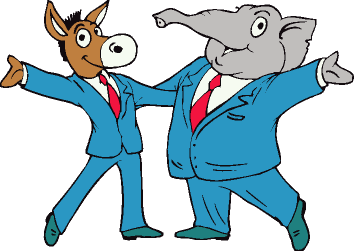 WHAT ‘REPRESENTATIVES’ – WHERE?
WHAT ‘REPRESENTATIVES’ – WHERE?
The parties have hijacked the political process by representing privileged interests instead of the people. Rather than attend to the interests of their denizens by obtaining revenues from whence they ought to come–thereby setting the economy on a course of steady and sustainable growth–politics has degenerated into a popularity contest behind which deals are done with the big rent-seekers.
As far as the parties are concerned, the decision-making necessary for a quick exit from the GFC can go jump, because appropriate action will bring unpopularity, not the least with those special interest groups who lobby and largely fund them. To turn this situation on its head and re-educate the public away from a speculative mindset is too big a brief for them! Better to try to forestall further economic and social collapse for as long as possible by printing money, austerity, anything, rather than taking the necessary medicine by acting now.
Parties of all shades have come to endorse dilatory tactics, because they don’t want to see beyond this blinkered, short term view. One party is as mediocre as this other in this game; they only have to attract enough of the middle ground punters to get their party back into power. The major parties march under seemingly alternative populist banners of ‘greater social justice’ or ‘better economic management’, whilst at the same time cosying up to rent-seeking interests who’d like to own society’s natural monopolies so they can extract risk-free incomes.
Once in power, none of the parties delivers what it had represented to swinging voters, nor even what the other party had represented, because it hasn’t an economics capable of supporting those programs. As the economy seems to have a mind of its own, parties will simply cling to power as long as possible, until the people, having had enough of them, will put the other party into office in a forlorn hope of improvement. And so the cycle repeats: just as certainly as the cycle of boom and bust which mocks the parties’ efficacy.
Some examples that political parties are obsolete? President George W Bush and his advisors, representing the ‘better economic management’ of the Republican Party, managed to engineer the financial downfall of the United States of America. [“Phew! Lucky you got outta there, George Dubbya?”]
The other side is no better. In the UK, Gordon Brown, representing Labour and ‘greater social justice’, helped the wealthy get rich at the expense of the poor and the middle class during his time as ‘the world’s greatest treasurer’. Having won the prime ministership of Britain by backstabbing Tony Blair, Brown now blames the ‘Global Financial Crisis’ for Britain’s economic woe – as though it’s unrelated to his inept decision-making during his chancellorship of the exchequer! In that position Brown had actually boasted there would be no return to boom/bust!
Meanwhile in Australia, Peter Costello, also claiming a supreme ability for his economic management, managed to widen the rich-poor gap as he clasped to his breast the faux-prosperity he manufactured out of arguably the world’s greatest real estate bubble.
When Australians sacked the Liberal Party/National Party coalition from government in 2007, they also removed Prime Minister John Howard from his seat of Bennelong. Peter Costello seemed to have read the portents from his time as treasurer, not wishing to lead the Liberal Party in opposition during a period of slowing economic growth emanating from the real estate bubble he fostered. So he’d sit on the backbenches, write his memoirs, then get the hell out of there!
Labor Prime Minister, Kevin Rudd, has decided not to draw attention to Costello’s failure to address the incredible ten year real estate bubble, because he’d been silent on it, too. Speaking out on it might involve him in taking action against it instead of keeping it inflated, and that’s not what politics is about these days: fixing economies. It’s about continuing to grant favours to rent-seekers and hanging on in there and making yourself look good for as long as possible before they wake up to you.
So, rather than face the music and let the bubble deflate, Kevin Rudd and treasurer Wayne Swan have chosen to delay Australians from taking their depressionary medicine – by feeding the bubble. Wage earners were given $900 to spend; although numbers of real estate sales were down, the First Home Owners’ Boost kept prices up, while government capital spending on house roof insulation and spending on schools ensured a positive GDP. Both know this will only delay and worsen the crash but, these days, it’s all about buying time.
There’s a history to be written, so, during this period of deferring the inevitable, Rudd plays the climate change tune. Although nothing came out of Copenhagen, few doubt Rudd’s committed involvement on the world stage, and he’ll certainly take his extensive networking and the negotiation skills he displayed to the next election! But as for taking action that will resurrect the economy …. forget it!
Political parties’ preference for counter-productive taxes and encouraging real estate bubbles has slowly but surely eroded initiative and delivered us into another economic depression.
It’s beyond time to let political parties know they’re failing us.